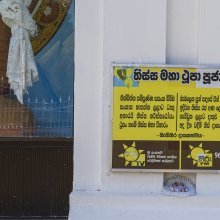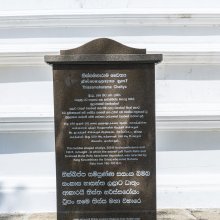Bimba, Vimbā, Vimba: 33 definitions
Introduction:
Bimba means something in Buddhism, Pali, Hinduism, Sanskrit, Jainism, Prakrit, the history of ancient India, Marathi, Hindi, biology. If you want to know the exact meaning, history, etymology or English translation of this term then check out the descriptions on this page. Add your comment or reference to a book if you want to contribute to this summary article.
Bimba has 32 English definitions available.
Alternative spellings of this word include Binb.
Images (photo gallery)
Languages of India and abroad
Sanskrit dictionary
[Deutsch Wörterbuch]
Source: Cologne Digital Sanskrit Dictionaries: Böhtlingk and Roth Grosses Petersburger WörterbuchBimba (बिम्ब):—(vimba) [UJJVAL.] zu [Uṇādisūtra 4, 95.] m. n. gaṇa ardharcādi zu [Pāṇini’s acht Bücher.2, 4, 31.] [Trikāṇḍaśeṣa 3, 5, 10.] —
1) m. n. die Scheibe der Sonne oder des Mondes [Amarakoṣa 1, 1, 2, 17.] [Hemacandra’s Abhidhānacintāmaṇi 107.] [Anekārthasaṃgraha 2, 305.] [Medinīkoṣa b. 7.] [Halāyudha 1, 44.] arka [Śākuntala 170.] vivasvataḥ [Prabodhacandrodaja 114, 10.] aindava [94, 13.] śaśāṅka [Mṛcchakaṭikā 67, 25.] [Sūryasiddhānta 10, 9. 11. fgg.] [Caurapañcāśikā 10.] [Mārkāṇḍeyapurāṇa 84, 11.] vadanena nirjitaṃ tava nilīyate candravimbamambudhare [Spr. 2710.] candravimbānana [3246.] pūrṇendubimbānanā [Śrutabodha] [?(BR.) 43.] —
2) m. n. Kugel, Halbkugel, Scheibe überh.; (am Körper) rund hervortretende Theile: śroṇī [Mālavikāgnimitra 56.] [Spr. 2833.] nitamba [Ṛtusaṃhāra 1, 4.] upacīyamānanitambabimbā adj. [Pañcatantra ed. orn. 49, 23.] [Vikramorvaśī 100.] einer Wolke [Meghadūta 48.] masc. (neutr. die Berliner Hdschr.) [Suśruta 1, 338, 9.] ādarśa (Metall-)Spiegel [Kumārasaṃbhava 7, 22.] Dieselbe Bed. hat wohl das einfache Wort in der Stelle: yathaiva vimbaṃ mṛdayopaliptaṃ tejomayaṃ bhrājate tatsudhātam [ŚVETĀŚV. Upakośā 2, 14.] Die Bed. Krug, Wassertopf in [UṆĀDIVṚ. im SAṂKṢIPTAS.] [?(Śabdakalpadruma)] beruht wohl auf einer Verwechselung von kamaṇḍalu mit maṇḍala . —
3) m. n. Bild, Abbild [Trikāṇḍaśeṣa 3, 3, 282.] [Hemacandra’s Anekārthasaṃgraha] [Medinīkoṣa] sva [Bhāgavatapurāṇa 3, 2, 11.] buddha [Rājataraṅgiṇī 3, 464. 4, 259. 261.] bimbādivoddhṛtau bimbau rāmadehāttathā parau Urbild und Abbild [Rāmāyaṇa 1, 4, 12] (Schol.: bimbātsūryāderutthitau bimbāviva pratibimbāviva). rūpānurūpau rāmasya bimbādbimbamivodgatau [Rāmāyaṇa Gorresio 1, 3, 51.] In Gleichnissen das Verglichene im Gegens. zu pratibimba dem Abbilde [PRATĀPAR. 77,a,8. 93,b,6] (s. u. prativimba) . —
4) n. die Frucht der Momordica monadelpha Roxb. (bimbī), mit deren rother Farbe die Lippen verglichen zu werden pflegen. [Trikāṇḍaśeṣa 3, 3, 282.] [Hemacandra’s Anekārthasaṃgraha] [Medinīkoṣa] phala [Spr. 2981.] phalādharoṣṭha [Kumārasaṃbhava 3, 67.] pakvabimbādharoṣṭhī [Meghadūta 80.] [Rgva tch’er rol pa ed. Calc. 405, 2.] bimbādhara [Śākuntala 147.] [?ad 69, 2. Kumārasaṃbhava 3, 56. Spr. 2597. Bhāgavatapurāṇa 4, 26, 25.] bhāsvadbimbādharā [Rājataraṅgiṇī 3, 416.] vimboṣṭha [Spr. 2831.] [Kathāsaritsāgara 4, 8.] bimboṣṭhī und bimbauṣṭhī adj. [UJJVAL.] zu [Uṇādisūtra 2, 4.] [Mahābhārata 4, 255.] [Śrutabodha 27.] [Rājataraṅgiṇī 3, 482.] —
5) m. Eidechse, Chamäleon [Medinīkoṣa] —
6) m. Nomen proprium eines Mannes [Patañjali] zu [Pāṇini’s acht Bücher 4, 1, 97.] [Rājataraṅgiṇī 7, 216. 1643. 8, 426. 545. 792.] —
7) f. ā Momordica monadelpha Roxb., eine Cucurbitacee, [Śabdaratnāvalī im Śabdakalpadruma] f. ī (gaṇa gaurādi zu [Pāṇini’s acht Bücher 4, 1, 41)] dass. [Hemacandra’s Abhidhānacintāmaṇi 1185.] [Halāyudha 2, 48.] [Śabdaratnāvalī im Śabdakalpadruma] [Suśruta 1, 29, 6. 137, 15. 144, 14. 145, 5. 212, 17. 2, 247, 2. 327, 13.] vimbi [480, 11.] —
8) f. ā a) Name zweier Metra: α) 4 Mal {Ç} {Ç} [Colebrooke II, 159 (IV, 8).] — β) 4 Mal {Ç} {Ç}, ebend. [163 (XIV, 5).] — b) Nomen proprium der Gemahlin Bālāditya’s, Königs von Kāśmīra, [Rājataraṅgiṇī 3, 482.] —
9) f. ī Nomen proprium der Mutter des Königs Bimbisāra [Lebensbeschreibung Śākyamuni’s 235 (5).] — Vgl. prativimba, baimbaki .
--- OR ---
Bimba (बिम्ब):—
3) prabhavati śucirbimbodgrāhe maṇirna mṛdāṃ cayaḥ [UTTARARĀMAC. 27, 8 (35, 18). Z. 2. fgg.] vgl. ubhau rāmasya sadṛśau bimbādbimbamivoddhṛtau [Rāmāyaṇa 7, 94, 13.]
Source: Cologne Digital Sanskrit Dictionaries: Sanskrit-Wörterbuch in kürzerer FassungBimba (बिम्ब):——
1) m. n. (adj. Comp. f. ā) — a) die Scheibe der Sonne oder des Mondes. — b) Kugel , Halbkugel , Scheibe überh. ; insbes. die rund hervortretenden Theile des Körpers. — c) Spiegel. — d) Bild , Abbild. — e) in Gleichnissen das Verglichene. —
2) m. — a) Eidechse , Chamäleon [Gautama's Dharmaśāstra 22,19.] — b) Nomen proprium eines Mannes. —
3) f. ā — a) *Momordica monadelpha , eine Cucurbitacee. — b) Name zweier Metra. — c) Nomen proprium einer Fürstin. —
4) f. ī — a) Momordica monadelpha. — b) *Nomen proprium der Mutter Bimbisāra's. —
5) n. die rothe Frucht von Momordica monadelpha , mit der die Lippen häufig verglichen werden.
Sanskrit, also spelled संस्कृतम् (saṃskṛtam), is an ancient language of India commonly seen as the grandmother of the Indo-European language family (even English!). Closely allied with Prakrit and Pali, Sanskrit is more exhaustive in both grammar and terms and has the most extensive collection of literature in the world, greatly surpassing its sister-languages Greek and Latin.
See also (Relevant definitions)
Starts with (+26): Bimbadarshana, Bimbadevi, Bimbadhara, Bimbadhare, Bimbagama, Bimbagata, Bimbagrahaka, Bimbagrrahi, Bimbahu, Bimbaja, Bimbaka, Bimbakacchapa, Bimbakachchhapa, Bimbakalpane, Bimbaki, Bimbal, Bimbala, Bimbalakshana, Bimbalekha, Bimbali.
Ends with (+42): Adarshabimba, Aimdavabimba, Anubimba, Arhatpratibimba, Atreyabimba, Bhubhabimba, Bhubimba, Bhutabimba, Bradhnabimba, Cakrabimba, Candrabimba, Caturmukha-bimba, Chandrabimba, Cittabimba, Divyabimba, Grahyabimba, Hastabimba, Himakarabimba, Indubimba, Jagadbimba.
Full-text (+232): Bimbaka, Bimbeshvara, Prativimba, Bimbaphala, Shronivimba, Nitambabimba, Bimbita, Bimbava, Vimbagata, Bimboshtha, Hastavimba, Vimbaja, Motibindu, Baimbaki, Bimbadhara, Bhubimba, Jalabimba, Vimbaphaladharoshtha, Vimboshtha, Bimb.
Relevant text
Search found 67 books and stories containing Bimba, Vimbā, Vimba, Bimbā, Biṃba; (plurals include: Bimbas, Vimbās, Vimbas, Bimbās, Biṃbas). You can also click to the full overview containing English textual excerpts. Below are direct links for the most relevant articles:
Garga Samhita (English) (by Danavir Goswami)
Verses 2.15.26-27 < [Chapter 15 - Description of Śrī Rādhā-Kṛṣṇa’s Falling in Love]
Verse 5.21.41 < [Chapter 21 - The Story of Śrī Nārada]
Verse 1.16.5 < [Chapter 16 - Description of Śrī Rādhikā’s Wedding]
Dhammapada (Illustrated) (by Ven. Weagoda Sarada Maha Thero)
Verse 147 - The Story of Sirimā < [Chapter 11 - Jarā Vagga (Old Age)]
Verse 351-352 - Māra seeks in vain to frighten Rāhula < [Chapter 24 - Taṇhā Vagga (Craving)]
Verse 197-199 - The Story of the Pacification of the Relatives of the Buddha < [Chapter 15 - Sukha Vagga (Happiness)]
Bhakti-rasamrta-sindhu (by Śrīla Rūpa Gosvāmī)
Verse 3.3.73 < [Part 3 - Fraternal Devotion (sakhya-rasa)]
Verse 2.4.188 < [Part 4 - Transient Ecstatic Disturbances (vyābhicāri-bhāva)]
Verse 2.3.56 < [Part 3 - Involuntary Ecstatic Expressions (sattvika-bhāva)]
The Linga Purana (by J. L. Shastri)
Chapter 6 - The origin and activities of Alakṣmī < [Section 2 - Pūrvabhāga]
Chapter 27 - The description of the Jaya ablution < [Section 2 - Pūrvabhāga]
Maha Prajnaparamita Sastra (by Gelongma Karma Migme Chödrön)
Ninth comparison or upamāna: A reflection (bimba) in a mirror (ādarśa) < [Bodhisattva quality 19: the ten upamānas]
Third comparison or upamāna: The moon reflected in water (udakacandra) < [Bodhisattva quality 19: the ten upamānas]
Introduction: the ten comparisons (upamāna) < [Bodhisattva quality 19: the ten upamānas]
The Tattvasangraha [with commentary] (by Ganganatha Jha)
Verse 2588-2590 < [Chapter 24b - Arguments against the reliability of the Veda (the Revealed Word)]
Related products


